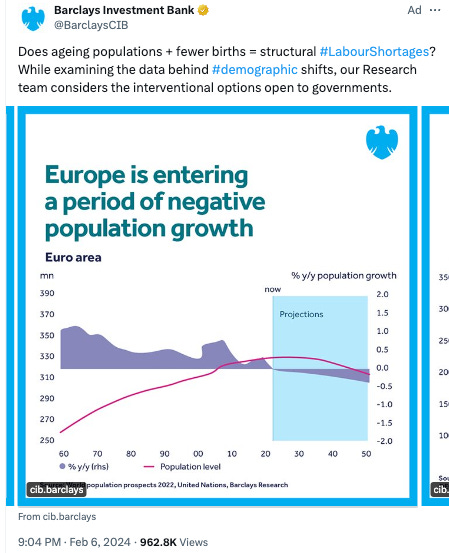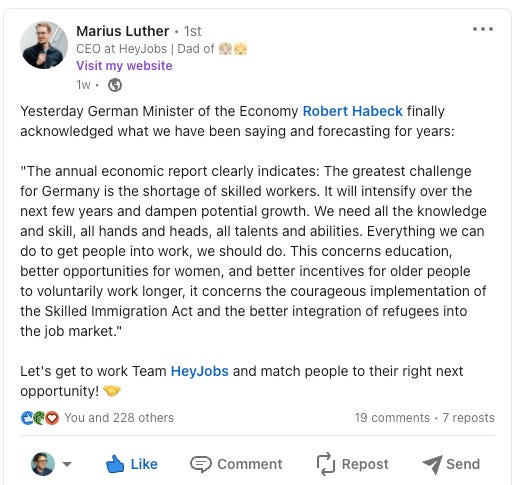Product management diversity as a competitive advantage.
Journal scrolling and the case of SuccessFactors Employee Central.
As an immigrant in Germany, I fall into the diverse hiring is a good thing camp. I’m convinced of the positives of immigration, both for immigrants and for the German economy. The demographics are obvious.
Marius at Heyjobs provides an excellent commentary on the German job market. He also backs it up with really good stats from both Heyjobs data and other sources. He helpfully translated the German Business Minister’s recent speech.
As an investor, I’ve been looking closely at recruitment technology space, in part because the macro-economic factors point to continuing shortages. Matching people to work is still an unsolved problem.
Robust empirical research on immigration and product innovation / competitiveness
Intuitively, at a company or product level, there are advantages for having a diverse team building your products, especially if you aim to sell those products internationally. I was thrilled to see this paper this morning, via Linkedin and SSRN.
Bahar, Dany and Carlson, Natalie and Hernandez, Exequiel, Global Palette: The Impact of Immigrant Talent on Multinational Product Strategy (December 15, 2023). Available at SSRN: https://ssrn.com/abstract=4710865 or http://dx.doi.org/10.2139/ssrn.4710865
There is lots of general research on MNC, immigration, globalization and so on, but this is the first paper I’ve seen that looks empirically at the role that immigrant product managers can play in product strategy and delivery.
Drawing on two remarkably fine-grained datasets, we examine 74,906 product launches by 340 US-based multinationals in the consumer packaged goods industry in 83 foreign markets during 2009-2019, matched to 7,876 skilled immigrant hires (on H-1B visas) by these firms over the same time period. The more immigrants from a given country a firm hires in the US, the more its subsequent products in that country exhibit locally-specific features. Hiring immigrants also leads to more frequent updates of preexisting products, especially in culturally distant markets relative to the US. Immigrants also help firms launch more new products in geographically distant countries after they are hired. These associations are stronger for more culturally-specific products (i.e., food and beverages vs. household and personal care) and hold only when immigrants occupy product-related roles (e.g., R&D, marketing, management) but not when they have non-product-related roles (e.g. accounting)
It makes a powerful argument, and it is a great example of robust data driven research.
An anecdotal mirror in HR technology. The case of Employee Central.
My experience building global HR systems mirrors this. I always felt that having diverse nationalities building SuccessFactors Employee Central enabled us to build something truly “global”, rather than inflicting a US (or German for that matter) mindset and therefore product on the world.
I remember seeing a demo in 2011, before I joined SuccessFactors, of a feature called “say my name” I thought it was a brilliant example of user centric design, and of empathy for immigrants. That little feature was a significant influence on my decision to leave Gartner and join Successfactors / return to SAP.
The speed at which we localized the product (4-6 countries a quarter) was due in part to the diverse team working on the product. Whether it was understanding Australian leave rules, or India wedding allowance provisions, or bilan social in Belgium, we were able to assess and understand the relative importance of these features for those markets. We understood the need for right to left text processing, and that capturing religion was important in Germany for church tax, but problematic elsewhere.
The product leadership team at SuccessFactors was made up of Americans, Australians, Russians, Germans, Indians, Frenchs, Canadians, South Africans, Irish, Chinese, Spanish, French, Hungarians and more. It meant that the conceptual product design was itself more global in nature, and that localization wasn’t just an afterthought. The competition at the time was fierce, but the speed at which we globalized and scaled EC surprised many observers and competitors. I’m convinced it was because of the international make up of the team.
Advice for HR technology vendors with global ambitions, dial down the hubris.
I’ve seen a wave of talent management and EOR vendors making ambitious announcements about building global HR platforms. I’m skeptical. It is really hard to go from building a talent management app, which has limited localization requirements to building something that actually is responsible for compliance and regulatory support. I’ve got the scars here.
For founders that grasp this complexity, and are thinking of innovative ways of attacking it, I’d love to talk.
I’ve a couple of posts you might like to read.
What I learnt from SuccessFactors: Part 1.
I first got to know SuccessFactors as a competitor while I worked at SAP, probably around 2004-5. SAP’s leadership at the time largely ignored how early SaaS vendors like Salesforce and SuccessFactors were making inroads into even large enterprise customers. SAP’s lack of focus on HCM was a major reason why I ended up moving to Gartner in 2008.
When I remember, I add a song that has a tangential link to the post. This one is a cracker.







Thank you very much for highlighting the contribution of immigrant talents. Can I seek your opinion on one point please?
I looked at HeyJobs and noted that most job ads were in German. Same with LinkedIn - German fluency was often required. Could this impact the interest of immigrants who do not speak German or are still learning (which may take time)? In fact, many German companies are impressively global with international operations overseas, so communications could already be in English.